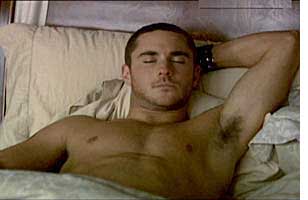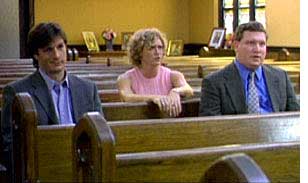
 |
||||||
|
GAY
FILM REVIEWS BY MICHAEL D. KLEMM
|
||||||
|
Boy Culture TLA Releasing, 2006 Director: Screenplay:
Starring: Unrated, 88 minutes
Outing Riley Wolfe Video, 2004 Director/Screenplay: Starring: Unrated, 86 minutes
|
Both
Sides Of The Fence
"If you're smart, you've guessed I'm a hustler," says a nihilistic young man - in voice-over - named X. "If you haven't, here are two clues. I'm gay and they made a movie about me. Try to keep up." |
 This
is how Q. Allan Broka begins his festival favorite, Boy
Culture, an interesting - if uneven - Midnight Cowboy
for the new millennium. X (Derek Magyar) is a 25 year old hustler with an
exclusive clientele; he calls them his "disciples" - the Judge, Father of
6, Barely Breathing... we meet all 12 in a rapid montage. X keeps a scowling
statue of the Virgin Mary in his closet because he thinks "she looks like
she's demanding a child support check from God." X has sex only for money
and masturbates after each trick as an "eraser." This
is how Q. Allan Broka begins his festival favorite, Boy
Culture, an interesting - if uneven - Midnight Cowboy
for the new millennium. X (Derek Magyar) is a 25 year old hustler with an
exclusive clientele; he calls them his "disciples" - the Judge, Father of
6, Barely Breathing... we meet all 12 in a rapid montage. X keeps a scowling
statue of the Virgin Mary in his closet because he thinks "she looks like
she's demanding a child support check from God." X has sex only for money
and masturbates after each trick as an "eraser." |
|
|
|
|
|
|
|
|
|
|
|
Broka also directed Eating Out - a film that I hated (with the exception of that great phone sex scene in the middle) - and while Boy Culture is a huge leap forward, it doesn't quite reach its potential. I predict his third film will be the charm. The DVD features a commentary, interviews and deleted scenes.
|
|
|
Watching a gay film made by straights can be schizophrenic. Take, for example, Outing Riley, the second film by Pete Jones - the indie filmmaker featured in the first season of HBO's Project Greenlight. Though straight, Jones has written and directed this uneven, but often moving, story about four Irish brothers and what happens when the youngest sibling comes out. Like Boy Culture, the brilliant and the clumsy co-exist, but when this film gets something right it hits it on the nail. |
|
|
|
|
|
|
|
 For
years, our community has suffered through so-called "gay films" that would
always emphasize the family coming to terms with the "crisis" while marginalizing
the protagonist. At first I thought that this one was no different until
I began to notice how realistic the reactions of these brothers were. Luke
and Connor are hardly role models - Luke is a pothead and Connor surfs internet
porn while telling his wife he is studying the stock market. Both men are
clueless; their world has been shaken up, yet their conversation - when
they finally discuss their brother - is surprisingly intelligent. Connor
asks how he is going to explain it to his kids when Bobby and his boyfriend
make out in front of them, and Luke says "I'm sure that gay people have
manners." For
years, our community has suffered through so-called "gay films" that would
always emphasize the family coming to terms with the "crisis" while marginalizing
the protagonist. At first I thought that this one was no different until
I began to notice how realistic the reactions of these brothers were. Luke
and Connor are hardly role models - Luke is a pothead and Connor surfs internet
porn while telling his wife he is studying the stock market. Both men are
clueless; their world has been shaken up, yet their conversation - when
they finally discuss their brother - is surprisingly intelligent. Connor
asks how he is going to explain it to his kids when Bobby and his boyfriend
make out in front of them, and Luke says "I'm sure that gay people have
manners." |
|
|
I'm not really sure who the target audience is. Despite faults, it could easily appeal to both sides of the fence. To be honest, Jones writes better straight characters than gay ones; Bobby is probably the straightest gay guy I have ever seen in a movie. He's pudgy, he drinks lots of cheap beer, and loves the Chicago Cubs. I liked it that he wasn't fabulous but, though we do see him embrace and kiss his lover, there is always a blackout to avoid showing further intimacy. (There IS, however, extended gratuitous female nudity during a scene where Luke is being a voyeur.) But I loved Bobby's sense of humor. Outing Riley and Boy Culture both share an effective use of voice-overs for ironic comedy. When Andy accuses Bobby of being afraid to hold hands in public, he begins to cry. The camera freezes on Bobby as he thinks: "Oh shit, it never happened like this before. Okay, hugs and kisses always gets him to stay." When he tries to screw up the courage to tell his brothers, he thinks, "When I get nervous, my voice gets really high. I'm afraid that when I actually say I'm gay - only dogs will hear it." |
|
|
Outing Riley is well acted and there is believable chemistry between the brothers. Not a great film, but it has its moments... many of them in fact. My screener didn't come with the extras, but the release disc will include a commentary and deleted scenes.
More
on Q Allan Broka: Darryl Stephens
also appears in:
|
|